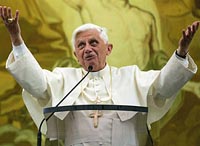Pope meets Muslim diplomats in new bid to defuse anger over Islam remarks
Muslim diplomats were meeting Monday with Pope Benedict XVI in the pontiff's latest effort to mend relations after his remarks about Islam and violence ignited the Vatican's most serious international crisis in decades.

Benedict's spokesman, the Rev. Federico Lombardi, said the meeting, at the Vatican summer residence, was "certainly a sign that dialogue is returning to normal after moments of ... misunderstanding." He predicted that the encounter would lead to further steps toward calm, constructive dialogue.
Since the Sept. 12 speech on Islam, Benedict has said that his remarks were taken out of context and said he regreted that Muslims were offended.
Italian police cars started pulling up in the square outside the papal palace in the hill town of Castel Gandolfo outside Rome, where Benedict is spending the last week of his summer holiday. A light rain was falling.
Vatican Radio said that it would cover the meeting live, and the speeches were scheduled to be shown to journalists on closed-circuit Vatican TV.
Cardinal Paul Poupard, a Frenchman who leads the Vatican's efforts at dialogue between religions, said that the pope planned to meet personally with participants.
Muslims in many cities around the world protested the remarks Benedict made at Regensburg University, where he once taught theology in his German homeland. Benedict quoted the words of a Byzantine emperor who characterized some of the teachings of the Prophet Muhammad as "evil and inhuman," particularly "his command to spread by the sword the faith."
Among the countries expected to send representatives were Iran, Iraq and Egypt.
Also expected were diplomats from Indonesia, where Christian-Muslim tensions were further heightened last week by the execution of three Catholic militants. Benedict last month had appealed for the men's lives to be spared.
Turkey also accepted the invitation. Benedict has said he hopes to go in November to that predominantly Muslim but officially secular country, whose officials were among the first to vigorously protest the Regensburg remarks.
Last week, the Holy See's ambassadors stationed in Muslim countries met with officials to assure them that the pope respects Islam and to urge a complete reading of the speech, which was an exploration of the relationship between faith and reason.
Lombardi said the acceptance by Muslim countries to the pope's invitation for Monday's meeting reflected a "desire to work together for the great ideals, the great objectives of peace, justice."
The Vatican and much of the Muslim world share some important goals for each side, including the battle against legalized abortion. Benedict also was among the first to urge Israel to use restraint and turn to dialogue in its battle in Lebanon against Hezbollah guerrillas over the summer.
A top aide of Poupard's, Monsignor Felix Anthony Machado, told Vatican Radio on Sunday that dialogue must be practiced when "times are favorable."
Such dialogue "is not an ambulance to call in times of crisis," Machado said, but rather, "the only hope in this world, where people get emotionally excited and take the path of violence."
On Sunday, Benedict praised an Italian missionary nun who was shot to death on Sept. 17 in Somalia in an attack that might have been linked to the worldwide anger over the Regensburg speech. Benedict noted that the nun forgave her attackers as she lay dying in Mogadishu, showing "the victory of love over hate and evil,"Associated Press writer Marta Falconi wrote.
Subscribe to Pravda.Ru Telegram channel, Facebook, RSS!





